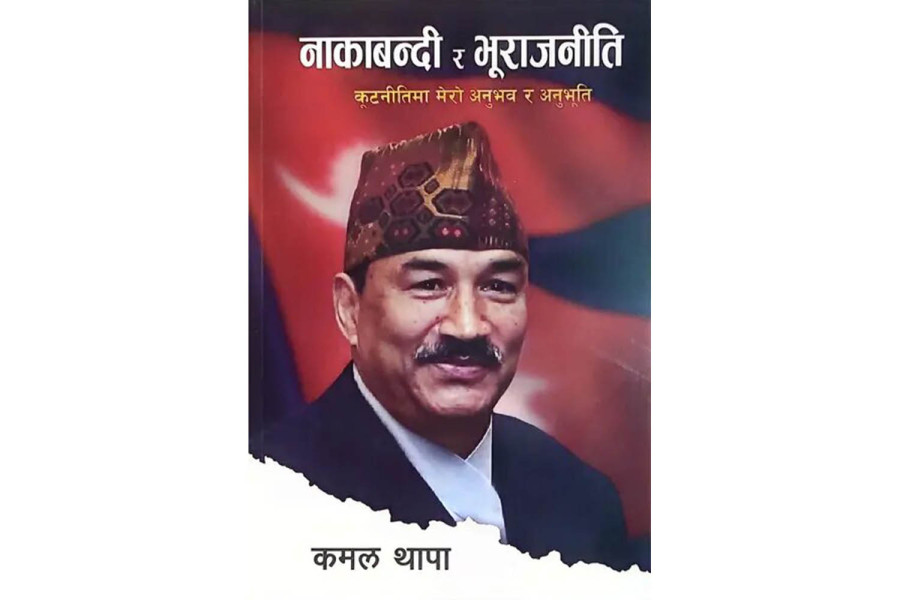Books
Former foreign minister’s view on geopolitics
Kamal Thapa’s ‘Nakabandi Ra Bhurajniti’ discusses Nepal’s geopolitical challenges during the 2015 Indian blockade and growing relations with China.
Jagdishor Panday
On August 26 this year, former Nepali Foreign Minister Kamal Thapa published his third book, the first on geopolitics, ‘Nakabandi Ra Bhurajniti’ (Blockade and Geopolitics).
Chairman of the Rastriya Prajatantra Party-Nepal Thapa’s book is focused on the Indian blockade in 2015 after a new Constitution was promulgated in Kathmandu. It also shows Nepal's growing relations with its northern neighbour, China, after the blockade.
In his book, Thapa presents four India blockades, two of which he witnessed. He was the Minister of Communications when India imposed a blockade for the third time in 1989 and the last time after issuing a new constitution in 2015.
Thapa has written about each visit as a foreign minister in many countries. He has also explained five crucial visits to India during the fourth Indian blockade in 2015. His visit to China and attendance at other international visits and programmes are also discussed.
Thapa has been foreign minister thrice. He first assumed the post in 1997 and again in 1997-98. The last time he was foreign minister was in 2015 when he also held the position of deputy prime minister.
The blockade occurred immediately after Nepal's new constitution came into effect, whereas the Royalist Thapa, who opposed the spirit of the new constitution, accepted the document. Thapa and his party favoured the inclusion of the King dynasty and Hindu religion in the new constitution and against the federal constitution of Nepal. Although Thapa signed against the new constitution, ironically, he advocated and defended the new federal constitution in the international arena.
Thapa has included six chapters to explain his experience, activities and thoughts as a three-times foreign minister. He starts the book with his experience in diplomacy and talks about the Peace and Friendship Treaty with India, including the disputed territory between two countries named Kalapani. In the third chapter, he explains his foreign trip with the then King Birendra Bir Bikram Shah. The most crucial chapter of this book is the fourth one on blockade. In this part, Thapa describes his appointment as a DPM and foreign minister and his crucial role in opening the blockade as a key aide of Prime Minister KP Sharma Oli.
It was Oli's first term as PM. Thapa explains how the EPG was formed and how its members were selected. He also explains his five India visits to open the blockade and describes PM Oli's India visit after New Delhi opened the blockade.
In the fifth chapter, Thapa discusses his visit to China to seek support from Beijing in response to the Indian blockade and recounts Prime Minister Oli’s visit to China. He describes how Oli visited a private construction company's office and met one-on-one with the head of the Chinese Communist Party's international department. Oli, the chairperson of Nepal's CPN-UML party, became upset during the meeting. These events highlighted the close ties between the communist parties of both countries. Thapa also mentioned that China took advantage of the Indian blockade to strengthen its relationship with Nepal.
In the last chapter, Thapa summarises his international engagement and a special SAARC foreign minister-level meeting in Pokhara.
In the book, Thapa claims that India's former Foreign Minister, Sushma Swaraj, was against the idea of imposing a blockade on Nepal, a stance she expressed during her address in the Rajya Sabha, India's upper house of parliament. Prime Minister Oli sent Thapa to New Delhi during the blockade to resolve the situation. While in Delhi, Thapa met with Prime Minister Narendra Modi, then External Affairs Minister Sushma Swaraj, and other BJP leaders and key officials from the Indian government.
In his book, Thapa writes, “As I understood at the time, Sushma Swaraj ji was not in favour of imposing a blockade on Nepal. I also noticed that Prime Minister Modi was upset with Sushma ji.” Thapa further describes a one-on-one meeting with Modi, where the Prime Minister expressed frustration, saying, "Your leaders did not fulfil the commitments they made when they came here." After returning to Nepal, Thapa raised this issue in an all-party meeting. Sher Bahadur Deuba, the president of the Nepali Congress, and Pushpa Kamal Dahal, chairperson of the CPN Maoist Centre, revealed the commitments themselves. Thapa adds, "How can it not remain as secular as they claim?"
From the outset, Thapa emphasises that geopolitical factors and the conceptual differences between the two countries were the primary reasons behind the blockade. However, throughout the book, former Foreign Minister Thapa portrays himself as playing a central role in every key action and decision during this critical period. While his involvement was significant, placing himself at the centre of all events may not be appropriate. His role, after all, was secondary to that of the Prime Minister, as he was primarily tasked with supporting the PM on foreign policy matters.
Thapa has tried to present himself as one of the best foreign ministers in Nepal's history, which might be true if evaluated. However, in his book, he frames the narrative to credit him for all the positive achievements while blaming others, including Prime Ministers and other parties, for any mistakes. This creates a sense of bias, similar to what is seen in former ambassador Ranjit Rae’s book ‘Kathmandu Dilemma: Resetting India-Nepal Ties’. In Rae’s book, he suggests that India did not impose the Indian blockade due to disruptions at the border by Madhesh-based parties, who were unhappy with Nepal’s new constitution. After reading his book, I felt that Rae’s inaccurate reporting from Kathmandu to New Delhi led to misunderstandings between the two countries, ultimately resulting in India’s decision to impose the blockade.
During our conversation, former Foreign Minister Thapa said that although China has played a major role in helping Nepal cope with the India blockade, there were reservations from the Chinese side. He explained how the Chinese were angry with him after he decided to drop a Chinese company from one project. I was surprised that Thapa didn’t include this in the book.
Moreover, during the five-month-long blockade, the then Nepali Army Chief Rajendra Chettri played a crucial role in breaking the deadlock in 2015 through ‘Military Diplomacy’. Thapa didn’t explain or highlight this incident as it deserved.
Thapa has made some technical mistakes in his book. For instance, he mentioned that the USA starts the General Debate at the United Nations General Assembly, which is incorrect. Since 1954, Brazil has traditionally opened the General Debate, with the USA being the second to speak as the host country of the UN headquarters.
In conclusion, former Foreign Minister Thapa’s book ‘Nakabandi Ra Bhurajniti’ is informative and offers a rich collection of important insights into Nepal’s geopolitical and bilateral relations with its neighbours during a crucial period. However, Thapa's personal biases are evident throughout the book.
Panday covers foreign affairs, politics and defence for Kantipur daily.
—
Nakabandi Ra Bhurajniti
Author: Kamal Thapa
Publication: Samvardhan Publication Pvt Ltd
Year: 2024
Price: Rs750




 22.64°C Kathmandu
22.64°C Kathmandu














